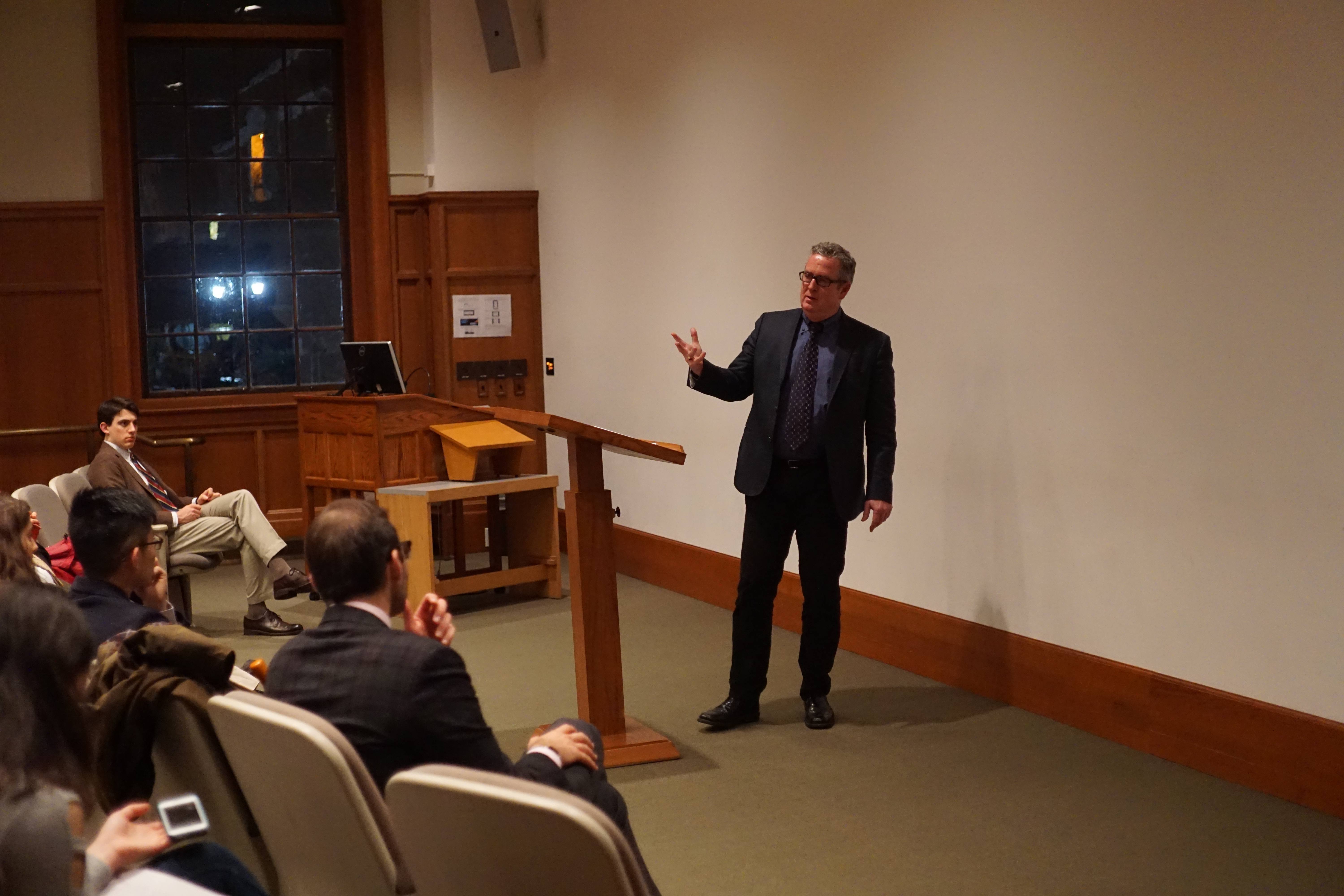

The Amherst Political Union (APU) hosted Andrew Kuchins ’81 for a lecture entitled “Fantasy and Reality: The Trump Administration and U.S./Russian Relations” on Tuesday, March 7. Kuchins, who majored in Russian, is a senior associate for the Russia and Eurasia Program at the Center for Strategic and International Studies and a senior fellow at Georgetown University’s School of Foreign Service.
In the lecture, Kuchins discussed the unique relationship between President Donald Trump and Russian President Vladimir Putin, in addition to the evolution of U.S. and Russian relations from the end of the Cold War era.
“There’s a big, big, big, big dark cloud over Washington and it’s most dark over the White House,” Kurchins began. “The name of that cloud is Russia.”
Kuchins outlined the lack of transparency surrounding U.S. and Russian relations, beginning with the recent controversy over meetings between top Trump advisors and Russian leaders during the presidential election campaign.
During his confirmation hearing, Attorney General Jeff Sessions, a former Alabama senator, failed to disclose that he met with Russian Ambassador Sergey Kislyak in July and September, sparking concerns that he committed perjury.
“There is nothing wrong with meeting with the Russian ambassador,” Kuchins said. “[Sessions] claims … that this had basically been normal, standard senator business in his position on the Armed Services Committee. There are 26 other senators on the Armed Services Committee. No other senator on the Armed Services Committee did [Russian] Ambassador [Sergey] Kislyak meet with around this time … So why does Senator Sessions not tell the truth about that meeting in his hearings in Washington? It’s curious.”
Former National Security Advisor Michael Flynn, who held the shortest tenure ever for the position — 24 days — stepped down after allegations that he misled Vice President Mike Pence regarding his conversations with Russian leaders. According to Kuchins, the Trump administration’s lack of transparency over conversations with Russia raises a red flag on actions that would otherwise be typical.
Kuchins compared U.S.-Russian relations today with the tense relationship they had in the 1980s at the culmination of the Cold War “Today, relations are worse than they have ever been since the early 1980s — perhaps even more dangerous in some ways than the 1980s because … we still have large arsenals [of nuclear weapons],” Kuchins said.
“They’re still pointed at each other, they’re still on hair trigger alert systems and if there was some type of accident that happened, it’s not inconceivable that we could see an escalation into a nuclear conflict,” he added. Kuchins said he takes the threat of a nuclear attack more seriously today than he did during the 1980s.
He quoted a colleague who described the current state of affairs as “sleepwalking on nukes,” a reference to historian Christopher Clark’s thesis that Europe “sleepwalked” into World War I. Kuchins did point to cooperation in the 2001 invasion of Afghanistan against the Taliban as a testament to potential for partnership between the U.S. and Russia.
However, he added, the current conflict in Syria is a stark contrast to the previous collaboration.
Another point of contention between Trump and Putin, according to Kuchins, is over Putin’s fear that Trump would support a Russian regime change. Kuchins pointed to U.S. involvement in regime changes in Iraq, Egypt, Libya and Syria as evidence for Putin’s concern, but added that he didn’t believe that a regime change would be part of Trump’s agenda.
“The regime change question also hits Mr. Putin very close to home,” Kuchins said. “The two times that there have been the most democratic moments in Russian history, it’s coincided with state collapse.”
Kuchins presented three possibilities for the future of U.S. relations with Russia, saying that he believes Trump currently lacks a clear policy on Russia.
Trump might immediately confront Russia, which Kuchins said he discouraged because Russia is too “radioactive” for Trump to take action now. Trump’s administration could also be weak and distracted by a series of “self-imposed errors,” which would give Russia free reign over international policy. Finally, Kuchins said that Trump would most likely return to a traditional and uncompromising conservative policy on Russia.
“The bromance and the pro-Russia campaign rhetoric — it’s going to be a distant memory … I think they’re likely going to represent the mainstream of the Republican party, which will be considerably tougher on Russia than the Obama administration and tougher than what a Hillary Clinton administration would be,” Kuchins said. “The relationship’s going to be pretty difficult.”
Kuchins’ lecture attracted a variety of students, including many members of the APU.
“I am most interested in international human rights … I thought it would be really interesting and very relevant and very timely to what’s going on in the country right now, and also [Kuchins] seems very impressive,” Elizabeth Sturley ’20 said.
Kuchins closed by addressing the title of his lecture, which juxtaposes fantasy and reality with Russian relations.
“I think it is a fantasy to think that Mr. Trump or anybody else could simply flip a switch, make a deal and that things were going to be hunky-dory,” Kuchins said. “I think the reality is that it is an important role to improve relations with Russia, for obvious reasons I think,” he added. “But it’s going to be very hard to do and it’s going to require a great deal of strategic thinking, deft diplomacy and mutual will.”